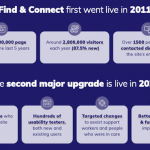The Department of Social Services (DSS) recently released a new publication: Access to Records by Forgotten Australians and Former Child Migrants: access principles for records holders, best practice guidelines in providing access to records. This document is a landmark step in the ongoing implementation of the recommendations made in the Senate’s 2004 ‘Forgotten Australians’ report. It addresses 3 recommendations in particular:
• supporting government and non-government agencies to agree on how care leavers, upon proof of identity only, can view all information relating to themselves and receive a full copy of such documents
• records being provided free of charge, and
• compassionate interpretation of legislation to allow information to be released to enable care leavers to identify their family and background.
The Principles and Guidelines were developed by Recordkeeping Innovation on behalf of DSS, in consultation with the Records Access Working Group and the Find and Connect Advisory Group.
The Principles and the Guidelines provides a much-needed ‘enabling framework’ for Records Holders, to enable maximum access to records to those who are the ‘subject’ of the records. It provides detailed, practical information about how organisations can take a proactive and liberal approach to releasing records.
The Guidelines go into great detail on the vexed issue of ‘third party access’, an area which has long caused great frustration and distress for many Care Leavers wishing to access information on their records about close family members. The document proposes that Records Holders take a different approach to what constitutes a ‘third party’, in the case of a Forgotten Australian requesting access to her or his institutional records:
… personal information may belong to more than one person simultaneously: for example, your mother’s name and family identification is your mother’s personal information, but it is equally your personal information. Using that logic, a great deal of information about family can quite legitimately be released to a Care Leaver.
The Guidelines cover the mechanics of providing access to records, including proof of identity requirements, costs and the format in which copies are given to Care Leavers.
We are delighted that the Principles and Guidelines have been made available to the public. The next part of the journey will involve Records Holders responding to the documents, endorsing the Principles and working to make them community practice. This is an important document, providing all Records Holders with the information and guidance to enable consistent, compassionate and appropriate access to information for Care Leavers.
These are the 12 Access Principles
Principle 1: Maximum provision of access to records
Records Holders will enable maximum information to be available to Forgotten Australians and Former Child Migrants about themselves, their family, identity and connection; circumstances surrounding placement in care; and details of time in care.
Principle 2: All information about themselves, and core identifying information about close family
Every person, upon proof of identity, has the right to receive all personal identifying information about themselves, including information which is necessary to establish the identity of close family members, except where this would result in the release of sensitive personal information about others. This includes details of parents, grandparents, siblings – including half siblings, aunts, uncles and first cousins. Such details should, at minimum, include name, community of origin and date of birth where these are available.
Principle 3: Copies of records
Every person, upon proof of identity, has a right to receive a copy of all records found relating to themselves.
Principle 4: No Fees or charges for access to records containing personal information
No application or copying fees or any other charge are to be imposed.
Principle 5: Time limits to respond to requests for records
Every Record Holder will establish timeframes, consistent with their jurisdictional practice for release of information, within which applicants, once any access conditions are met, will receive all relevant records.
Principle 6: Ability to seek review or appeal a decision
Records Holders will establish a review or appeal mechanism which can have another party, not part of the initial assessment, review decisions on what information is made available or withheld, and address any other grievance raised by an applicant, free of charge.
Principle 7: Records will be provided in context and applicants alerted to possible causes of distress
Every applicant will be advised of the nature and context of the information provided and the possibility of distress that may result from accessing records about them.
Principle 8: Right to know about support and assistance services
Every applicant has a right to receive information, both orally and in writing, at the time of application about appropriate support and assistance services available to them and be encouraged to use supported access services.
Principle 9: Care Leavers may annotate records to tell their story and express their wishes to limit access to records
Forgotten Australians and Former Child Migrants may annotate or add to their records to correct, amend and tell their story in relation to the events documented in their records. In addition, they may alert Records Holders that they do not wish records about their time in care to be accessed by family members, while they are still alive. The mechanisms for recording the wishes shall be stored in such a way as to be obvious whenever the records are accessed, and persistently linked to the record/s. The Records Holders will respect such wishes, but may, in exceptional circumstances and subject to demonstrated need (assessed using formally agreed criteria), determine that access is permitted by family members.
Principle 10: Applicants entitled to use the Find and Connect Services and their other support services to assist
Forgotten Australians and Former Child Migrants are entitled to have their Find and Connect Service or other support service, e.g. service provider, counsellor or case manager, involved in the process of locating and releasing records.
Principle 11: Records Holders will work collaboratively to enhance access
Records Holders will work collaboratively to identify and address policy and procedural barriers that adversely impact upon a person’s access to records as identified in Principle 1.
Principle 12: Government state or territory records holders are the repository of last resort
Where there is no ongoing legal organisation inheriting responsibilities, assets and/or staff of an organisation that undertook some form of out-of-home care, the state or territory department responsible for children’s services will become the repository of last resort for records relating to children in care.
The full document with the Principles and Guidelines can be downloaded from here.






Karen George
June 16, 2016 1:59 pmSadly the “liberalised access” to records discussed in the Guidelines (as excerpted below) in discussion about members of the Stolen Generations is not true and the battle to be allowed access to records, and particularly to information relating to third party family information is still ongoing:
“There are precedents for a more liberal access regime outside the legislative rules according to agreement. The Forgotten Australians Senate Report in particular recommended legislative revision to empower Care Leavers to get greater than normal access. In particular this form of liberalised access has been applied to members of the Stolen Generation in the past. In some jurisdictions these liberal rules are still available to members of the Stolen Generation, creating an iniquitous situation for Forgotten Australians and Former Child Migrants who suffered similar dislocation from family and community.”
While some of the recommendations of the almost 20 year old Bringing Them Home report have been acted upon, very many have not. Forgotten Australians, Former Child Migrants and members of the Stolen Generations all wait months and even years for records and then receive documents that are so highly redacted they are often almost useless. These new access guidelines need to apply across the board to anyone who was in Out-of-Home care as a child.
Cate O'Neill
June 17, 2016 10:13 amThanks for your comment, Karen. A timely reminder that just because policy documents and best access guidelines exist, this doesn’t mean that have been incorporated into practice.